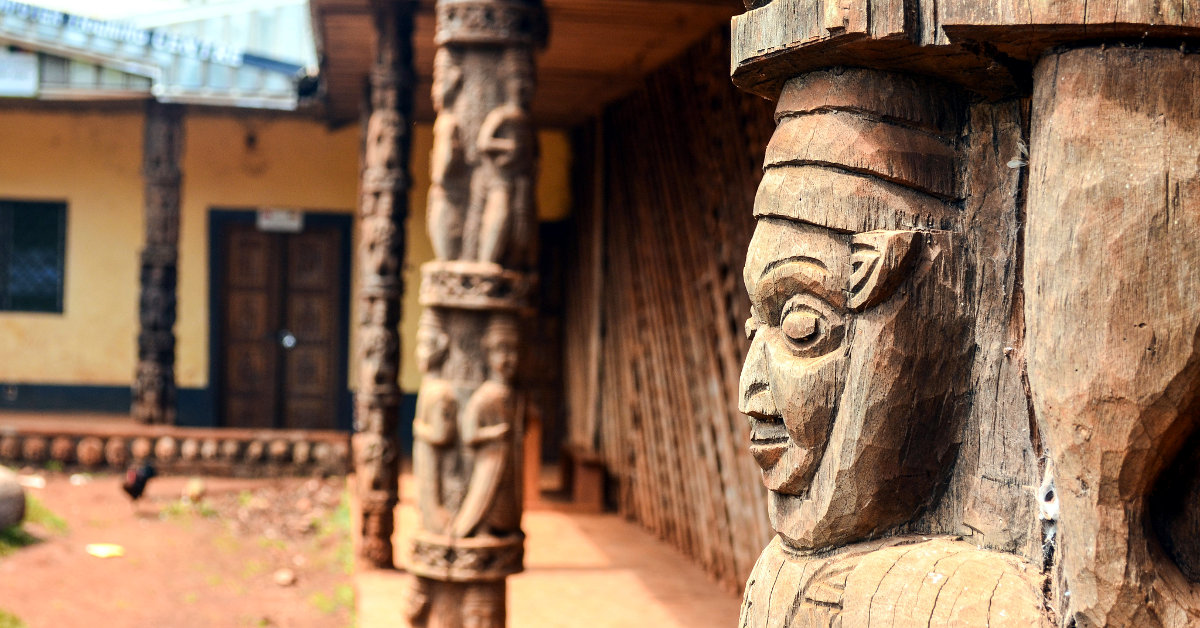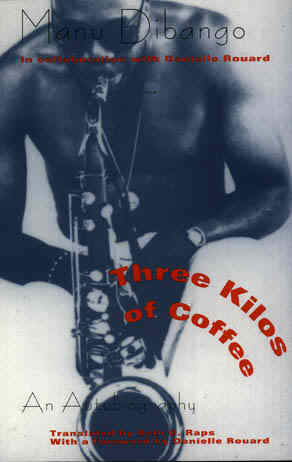I’m reading Three Kilos of Coffee, the autobiography of Manu Dibango, the Cameroonian saxophonist and composer. With his 1972 international hit Soul Makossa Dibango arguably became Cameroon’s most famous cultural export.
The book plods along chronologically. The occasional cultural and historical insights are wedged between anecdotes from his early career struggles. I was beginning to think that the things I like about this book — the cultural and historical insights — I could find elsewhere, and could find better written. Then I came across this passage:
Once an indigenous African civilization existed. By taking the trouble, we could find its trail, thanks to oral tradition. But who will make the effort? No doubt, Africa has had a bad break in its history. Since then, it is incapable of thinking of others and of its own future. Yet creating anew is the only path to health. The opportunities exist, though they arouse only disdain. Africa’s wealth is its creativity: it is our “real” coffee, our “real” cocoa. Africa treats its ills so casually. It waits for rich countries to erase its debt. This is the cheat of a remedy: the people and their successive governments tell themselves it will always be this way. Both lose in this illusion, to the point of forgetting the few vestiges of the culture they had. The statues die too.
Dibango, M , ( 1994 ) Three Kilos of Coffee; University of Chicago Press
Dibango states eloquently how I have felt — and how many who have lived and worked in Africa as foreigners have felt — about Africa’s potential juxtaposed to its actual progress.
When these frustrations are expressed by a non-African, the risk is sounding like a scolding schoolteacher harping, “…if you’d only apply yourself.”
I have heard and read these sentiments expressed by Africans as well, but perhaps never with this astute economy of words, like a soloist given only eight bars with which to touch your heart.
In my musical tastes, I’m an admirer of understatement. Don’t play ten notes when one note will do.
“Africa has had a bad break in its history.”
Manu Dibango: master of the understatement.
How Manu Dibango led me to Africa
I was ten years old when Soul Makossa was a hit. If I ever heard it back then, it made no conscious impression on me.
In my 20’s I was in a band called Jumping Genes. We played two Manu Dibango songs and we didn’t even know it. We learned of “Soul Makossa” via The Bonedaddys‘ cover of the song. And song “Choc ‘N’ Soul” came to us on a mix tape made for me by a friend who didn’t write any artists’ names on the track list.
Jumping Genes fulfilled my desire to, at least once in my life, be part of a gigging band. But the band dissolved when I accepted the invitation to serve the Peace Corps in Africa.
My Peace Corps service was in Cameroon — a country about which I knew very little. Without me realizing it (and certainly without him realizing it) Manu Dibango led me there.
Here are the original versions of Soul Makossa and Choc ‘N’ Soul. Enjoy:


Update March 24, 2020:
Manu Dibango died yesterday in Paris, from complications due to the coronavirus COVID-19.
The news was announced on his Facebook Page. He was 86.
Dear family, dear friends, dear fans,
A voice raises from far away…
It is with deep sadness that we announce you the loss of Manu Dibango, our Papy Groove, who passed away on 24th of March 2020, at 86 years old, further to covid 19.
His funeral service will be held in strict privacy, and a tribute to his memory will be organized when possible.
If you wish to express your condolences, please write to the following email : manu@manudibango.net
To Manu, Ad Lib…
Facebook: Manu Dibango – Officiel
- Focus on Africa – ‘Manu Dibango was the giant of African music’: Angélique Kidjo – BBC Sounds
- Manu Dibango: African saxophone legend dies of Covid-19 – BBC News
- Afro-Funk Saxophonist Manu Dibango Dies Of COVID-19 : NPR
Photo Credit: jbdodane (CC BY-NC 2.0)


2 comments
Anonymous
May 18, 2010 at 3:34 amGreat post. I am listening right now. I've never heard this tune. It strikes me that the American influence on this record is undeniable. Funk? Herbie Hancock?
Yet, the vocals definitely foreshadow some of what we here in hip hop today.
And it is a great record!
Ted
May 24, 2010 at 5:56 pmDibango says that his American influences were Duke Ellington and Louis Armstrong, but he eventually did work with Herbie Hancock on Dibango's album Electric Africa, which was produced by Bill Laswell. I don't have that album, but I intend to get it (since I've also recently realized that I'm way behind the curve on Bill Laswell).